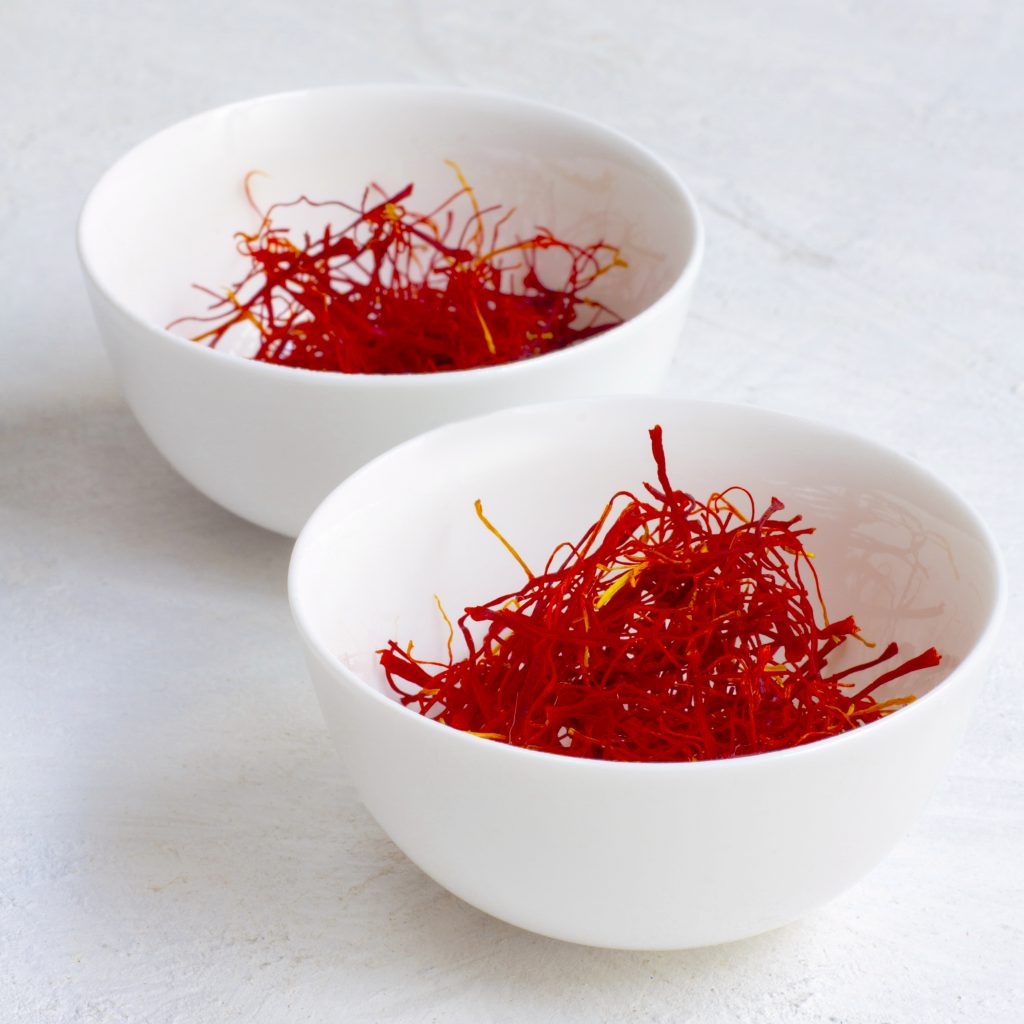Saffron: the sunlight in your kitchen and medicine cabinet

Saffron, which is often referred to as ‘red gold’, is one of the most precious and sought-after spices in the world. Derived from the dried stigmas of the Crocus sativus flower, saffron is renowned not only for its beautiful golden colour and earthy aroma, but also for its rich cultural, culinary, and medicinal significance.
Native to regions of Southwest Asia and cultivated primarily in Iran, India, and parts of the Mediterranean, saffron has been treasured for thousands of years. Its labour-intensive harvesting process (it requires over 150,000 flowers to produce just 1 kilo of spice) contributes to its high cost. Beyond its culinary uses in dishes like paella, biryani, and risotto, saffron has been used in traditional medicine, cosmetics, and even as a dye.
I love saffron because it’s a ray of sunshine in my kitchen. It complements sweet and savoury dishes alike, adding a warm depth impossible to replicate. A pinch in rice or a dessert transforms the dish into something luxurious; a thread in tea and you have a cup of something almost sacred. Its flavour and aroma are delicate yet unmistakable: earthy, rich and floral, with hints of honey. It enhances and elevates any food it touches. But saffron isn’t just delicious; it’s medicine too and its benefits are endless:
Antidepressant and anxiolytic effects
Saffron has well-documented antidepressant and anxiolytic properties. Several studies have shown that it may be as effective as some prescription antidepressants (like fluoxetine) for treating mild to moderate depression. The active compounds crocin, crocetin, and safranal are believed to increase levels of serotonin, dopamine, and norepinephrine in the brain.
Antioxidant powerhouse
Saffron contains powerful antioxidants including crocin, crocetin, safranal, and kaempferol. These help protect cells from oxidative stress, reducing damage caused by free radicals, one of the key factors in aging and chronic disease. Its antioxidant action also protects against oxidative damage to heart tissue.
Anti-inflammatory properties
Saffron has natural anti-inflammatory effects, helping to reduce inflammation at a cellular level. This makes it potentially useful in conditions where chronic inflammation is a contributing factor, such as inflammatory bowel disease, diabetes, rheumatoid arthritis and cardiovascular disease.
Cognitive support and brain enhancement
Research suggests saffron may improve memory and cognitive function. It shows promise in delaying the progression of neurodegenerative diseases like Parkinson’s and Alzheimer’s disease due to its antioxidant and anti-inflammatory effects.
PMS and menstrual support
Saffron has traditionally been used to ease menstrual discomfort and regulate cycles. Clinical studies have shown that it can reduce PMS symptoms such as irritability, cramps, and bloating.
Sexual health and libido
In traditional medicine, saffron has been used as an aphrodisiac. Modern studies back this up, showing improvements in sexual function, particularly in individuals experiencing antidepressant-induced sexual dysfunction.
Eye health
Saffron may help protect against age-related macular degeneration (AMD), one of the leading causes of vision loss. Crocin is believed to improve blood flow to the eyes and protect retinal cells.
Weight management and metabolism
Some studies suggest saffron can help curb appetite and reduce snacking, possibly by enhancing serotonin activity. It may also assist in regulating blood sugar levels.
Immune support
Thanks to its antioxidant, anti-inflammatory, and antimicrobial effects, saffron helps support the immune system and protect the body from infections and environmental stressors.
Digestive health benefits of saffron
Saffron’s bioactive compounds contribute to its soothing, anti-inflammatory properties that help support a healthy gut in multiple ways:
Saffron has mild carminative properties, meaning it can help reduce gas, bloating, and cramping. It helps relax smooth muscle in the gastrointestinal tract, which can ease general digestive discomfort. Saffron aids digestion and nutrient absorption by stimulating the secretion of digestive enzymes. It may also support healthy bile production, which is essential for breaking down fats.
Recent research suggests that saffron has prebiotic effects, helping support a healthy gut microbiome, which is so crucial for digestion, immune health, sleep, and mood regulation. Animal studies suggest that saffron protects the stomach lining and reduces ulcer formation, thanks to its anti-inflammatory and mucosa-protective effects.
I have been using these saffron drops for about six months now. The quality is second to none, grown and produced in France, and they are now shipping overseas.
6 Comments
kristenann
I love saffron! I’ve been taking it as a supplement in pill form off and on for a few years now for its happy mood benefits and for eye health. I rarely cook with it though. I should add some to my next batc of rice now that my sons are back to school and won’t balk at the different color and taste :).
kristenann
oops batch
The Healthy Epicurean
It’s so versatile isn’t it? I love it! I hope you’re well? X
kristenann
Thank you, yes, doing alright in this unfathomable era of insanity. I’ll be in your fine country next spring so looking forward to that!
The Healthy Epicurean
Wow really? Where are you going? If you find yourself in the southwest (Bordeaux/Landes/Basque country let me know🥰
kristenann
I will definitely let you know if I’m lucky enough to head to the southwest region! Right now I’m just scheduled to be in the east on a Rhine river cruise with my 80 year old dad. I’m hoping to extend the time though afterwards and head back to France to explore more, but not sure what’s in store quite yet.